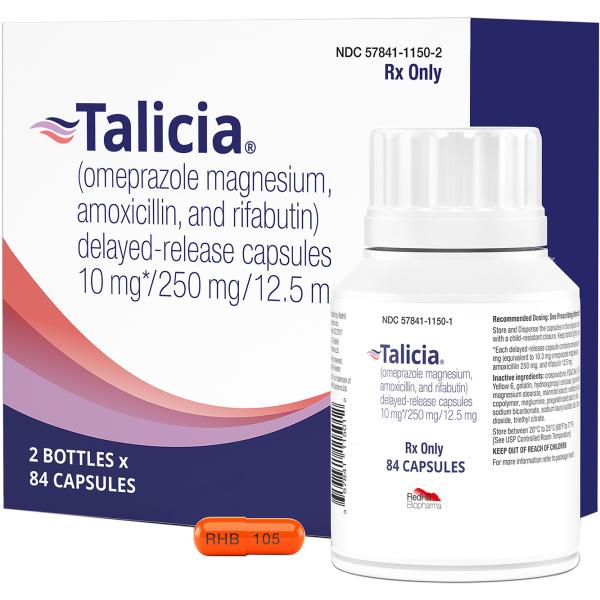Amoxicillin / Omeprazole / Rifabutin Dosage
Medically reviewed by Drugs.com. Last updated on Feb 11, 2025.
Applies to the following strengths: 250 mg-10 mg-12.5 mg
Usual Adult Dose for:
Additional dosage information:
Usual Adult Dose for Helicobacter pylori Infection
Amoxicillin 250 mg-omeprazole 10 mg-rifabutin 12.5 mg oral capsules: 4 capsules orally every 8 hours
- Duration of therapy: 14 days
Comments:
- Capsules should be swallowed with at least 8 ounces of water.
- This drug should be used to treat infections proven/strongly suspected to be caused by susceptible bacteria.
- Antibiotic selection should be determined by local bacterial resistance, duration of treatment, and appropriate use.
Use: Treatment of Helicobacter pylori infection
Renal Dose Adjustments
Mild to moderate renal dysfunction (Glomerular filtration rate [GFR] greater than 30 mL/min): Data not available
Severe renal dysfunction (GFR less than 30 mL/min): Not recommended.
Liver Dose Adjustments
Liver dysfunction (Child-Pugh Class A, B, and C): Not recommended.
Precautions
CONTRAINDICATIONS:
- Hypersensitivity to all the active components, any other rifamycins, other benzimidazoles (e.g., anthelmintics, proton pump inhibitors [PPIs]), other beta-lactam antibacterial drugs (e.g., cephalosporins, penicillins) or to any of the ingredients
- Patients receiving delavirdine, rilpivirine-containing products, and/or voriconazole
Safety and efficacy have not been established in patients younger than 18 years.
Consult WARNINGS section for additional precautions.
Dialysis
Data not available
Other Comments
Administration advice:
- This drug should be taken with meals.
- Capsules should be swallowed whole, without crushing/chewing.
- If patients miss a dose, the normal dosing schedule should be continued until this regimen is completed; patients should not take 2 doses to make up for the missed dose.
Storage requirements:
- Protect from light and moisture.
General:
- Alcohol should be avoided during treatment.
- Antacids may be taken with treatment.
Monitoring:
- HYPERSENSITIVITY: Signs/symptoms of hypersensitivity reactions
- METABOLIC: Blood glucose (in patients at risk of hypoglycemia)
- OCULAR: Signs/symptoms of uveitis (when used with macrolides or triazole antifungal agents)
Patient advice:
- Patients should be advised to avoid missing doses and to complete the entire course of therapy.
- Patients should be warned that treatment may produce a discoloration of sputum, sweat, tears, teeth, and urine; soft contact lenses may be permanently stained.
- Instruct patients to seek medical attention if signs/symptoms of hypersensitivity, acute interstitial nephritis, or systemic cutaneous lupus erythematosus occur.
- Patients should be instructed to report signs/symptoms of Clostridium difficile (e.g., watery/bloody stools, stomach cramps, fever), for up to 2 months after stopping treatment.
- Advise patients to speak to their healthcare provider if they become pregnant, intend to become pregnant, or are breastfeeding.
More about amoxicillin / omeprazole / rifabutin
- Check interactions
- Compare alternatives
- Reviews (25)
- Side effects
- During pregnancy
- Drug class: H. pylori eradication agents
- En español
Patient resources
- Amoxicillin, omeprazole, and rifabutin drug information
- Omeprazole, amoxicillin, and rifabutin (Advanced Reading)
Other brands
Professional resources
Other brands
Related treatment guides
See also:
Further information
Always consult your healthcare provider to ensure the information displayed on this page applies to your personal circumstances.


